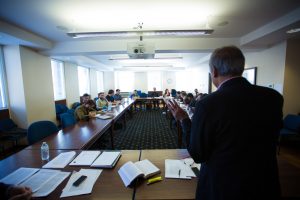
Five-year PhD Program: Requirements and Policies
Each incoming PhD student is assigned a faculty Advisor who, in conjunction with the Director of Graduate Studies (DGS), will recommend a suitable program of philosophy courses. Students are expected to acquire a broad competence in both History and Contemporary Problems of Philosophy and to develop an area of specialization prior to undertaking formal research for a doctoral thesis (see Breadth Requirements page).
The Advisor and the Director of Graduate Studies will be responsible for overseeing the student’s progress until the student has completed the course and breadth requirements and constituted a Thesis Committee. The Thesis Committee, consisting normally of three faculty members, assists the student in defining an area of specialized research within which he or she intends to write a dissertation.
The Committee approves a Research Reading List and guides the student in the writing of an (article-length) Qualifying Paper. On the basis of the paper and written and oral Qualifying Exams, the Committee then determines whether the candidate has met the Qualifying Requirement and can now begin formal research for the thesis.
In addition, by the end of August of the year in which the student completes their Qualifying Requirement, the student will designate a particular paper, typically written during coursework, as their Revision Paper and will solicit supervision on the revision of the paper from a faculty member using the Revision Paper form. Students should plan to complete the Revision Paper Requirement over one or two months depending on whether one or two rounds of revision are undertaken.
After satisfying the Qualifying Requirement the student selects a member of the Thesis Committee to be the Thesis Supervisor. By the end of September immediately following satisfaction of the Qualifying Year Requirement, the student produces and presents a Thesis Proposal to their Thesis Committee. The student remains under the guidance of the Thesis Committee through the final Oral Defence of the finished dissertation. Thesis Committees are required to provide regular reports of progress made by their students. At the end of the Qualifying Year, the student should also choose a Teaching Mentor.
Doctoral students are expected to proceed through the program without interruption. Leaves of absence on medical or personal grounds for a period of up to three terms (one academic year) require documentation. The graduate studies leave policy is detailed on the School of Graduate Studies website.
The Five-Year PhD Timeline summarizes the department’s due dates for each requirement. In addition, the Qualifying Year Checklist serves as a handy guide for the required steps during that year. To remain in good standing in the department, a student must complete each requirement by its due date. A student who falls out of good standing in the department is no longer guaranteed funding and no longer guaranteed a spot in the PhD program.
Faculty Program Advisors
Faculty program advisors are a resource for students: you can ask questions or get advice beyond formal relationships with academic administrators and your peers, and begin building your network. Key points:
- Faculty program advisors and students will be matched prior to the beginning of the Fall term according to research interests and availability as much as possible.
- Advisors are assigned to students for the duration of their coursework, so for one or two years depending on the program and the student.
- Advisors will reach out to students sometime in August to schedule a 30-45-minute meeting before Orientation and the beginning of classes. This meeting can be in person or online.
- There are no formal rules for this first check-in meeting, but it serves to help orient students to the department and can even be a place for informal guidance on course selection. More formal information sessions about the rules and regulations of coursework and requirements will already have taken place between the student and the director of graduate studies at that point.
- Faculty program advisors and students check in with each other during the first semester, usually in November. Further meetings usually happen once a semester, or more frequently if both parties wish and a check in during the winter term is highly desirable.
- If students apply for travel grants or the like during their course of study, faculty program advisors will sign these forms.
Graduate Student Peer Mentors
Graduate student mentors provide another informal resource for incoming students to help orient themselves to the department, the university, and life as a graduate student in Toronto. Students are matched as best as possible according to research interests and can take any form both sides find most helpful. Graduate student mentors might share experiences or resources—or might simply make for the first new friend in the department to have coffee with. Mentors and mentees can discuss work habits (how much reading should I expect to do in a week?), career choices (what are the best and worst aspects of being a graduate student?) and more. In our experience, the relationship has proven valuable and enjoyable for both mentor and mentee.
Teaching Mentors
Once students have passed their Qualifying Year, they should request faculty teaching mentors to help guide and assess their teaching. Students will reach out to a teaching mentor they would like to work with. Key points:
- Mentors should be available to review a graduate student’s teaching materials and, ultimately, the teaching dossier prepared for academic job searches.
- Mentors should observe a graduate student’s teaching at least once (more if there is room for pedagogical improvement during the first observation, to ultimately ensure a positive letter).
- Mentors should be listed on the graduate student’s Thesis Committee Report Form.
